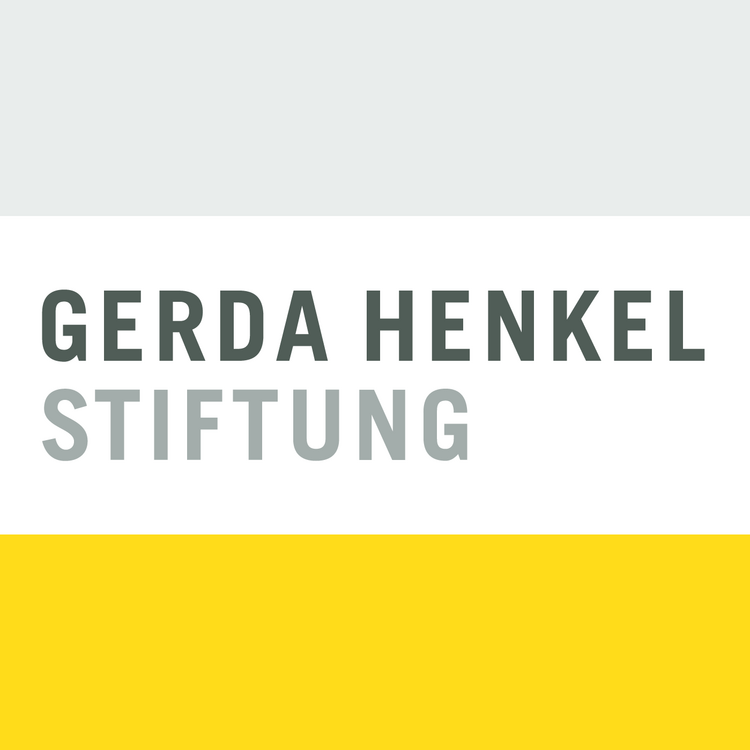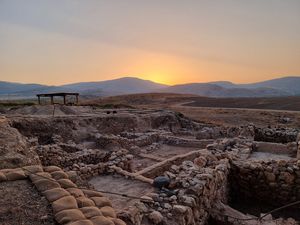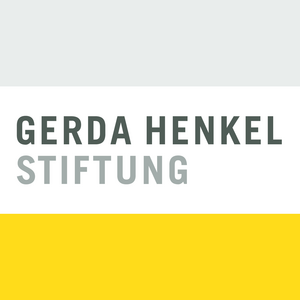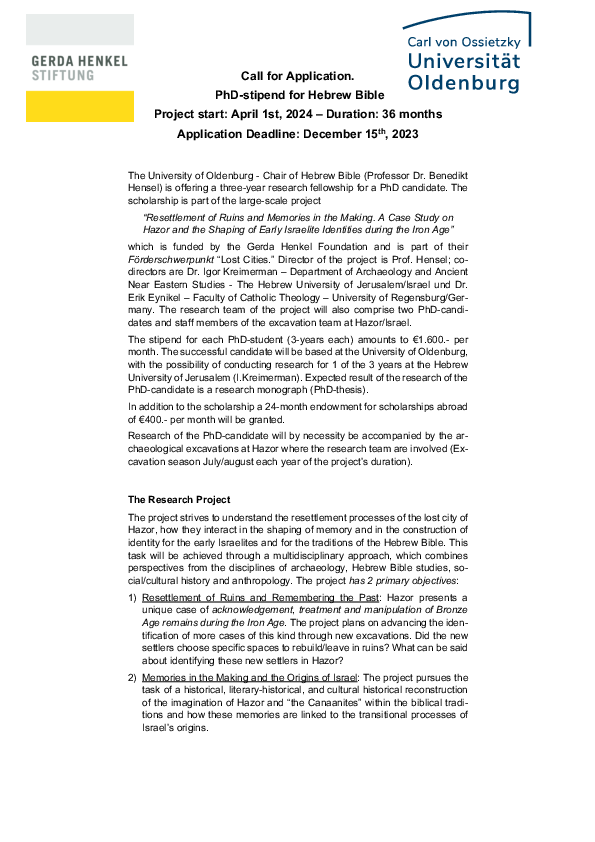Resettlement of Ruins and Memories in the Making
Direktor
Prof. Dr. Benedikt Hensel - Professur für Altes Testament und Biblische Archäologie

Gefördert durch die Gerda Henkel Stiftung (https://www.gerda-henkel-stiftung.de)
Projektleitung/Project director
Projektpartner
Projektstellen
Project office / Project coordinator
Maryam Matta – University of Oldenburg
Contact:
Assoziierte Forscher:innen
- Dr. Kishiya Hidaka (Perserzeitliche und hellenistische Literatur der Hebräischen Bibel und ihrer Umwelt)
- Prof. Dr.-Ing. Dr. h.c. Thomas Luhmann (Photogrammterie und Geovisualisierung, Jade Hochschule)
- Prof. Dr. Michael Sommer (Alte Geschichte, UOL)
- Prof. Dr. Dagmar Freist (Geschichte der frühen Neuzeit und Digitale Kulturerbeforschung)
- Projektassoziation mit den Digitales Kulturerbeprojekten an der UOL: Price Papers, DiViAS und ProSaDi.
Das Projekt in der Presse
mdr Wissen Bericht: Hazor: Deutsche Forscher wollen Ursprünge des Volkes Israel beleuchten (7.4.2024).
Eine antike Megastadt im Umbruch. Forschungsprojekt befasst sich mit der Besiedlungsgeschichte der eisenzeitlichen Metropole Hazor in Israel (02.04.2024).
Oldenburger Theologieprofessor Hensel ist Ko-Direktor von Israels derzeit größter archäologischer Grabung. Besondere Exkursion nach Hazor: Auch 20 Studierende sind bei Ausgrabung antiker Megastadt dabei (17. Juli 2023).
Resettlement of Ruins and Memories in the Making
A Case Study on Hazor and the Shaping of Early Israelite Identities during the Iron Age
Forschungsprojekt 2024-2027 im Förderschwerpunkt “Lost-Cities” der Gerda Henkel Stiftung
Project-team
Projektleiter:
- Prof. Dr. Benedikt Hensel - Chair of Hebrew Bible – University of Oldenburg/Germany
Projektpartner:
- Dr. Erik Eynikel – Faculty of Catholic Theology – University of Regensburg/Germany
- Dr. Igor Kreimerman – Department of Archaeology and Ancient Near Eastern Studies- The Hebrew University of Jerusalem/Israel
Project coordinator – Project office
Two Postdoc Positions:
- Sub-Project: „Archaeology of Hazor”: Dr. Nitsan Shalom (University of Oldenburg)
- Sub-Project „The Hebrew bible, memories in the making and the origins of Israel” (University of Oldenburg)
The Task of the Project
Within this recent and crucial discussion, the “Resettlement of Ruins and Memories in the Making”-project strives to understand the resettlement processes of the lost city of Hazor in their interaction with the memory shaping and identity construction of the early origins of Israel and in its significant literary traditions, which later become the Hebrew Bible. This task will be met
- through the lens of the megapolis of Hazor, whose complex settlement history of de- and re-urbanization as one of the largest former megacities of the Southern Levant in antiquity covers the entire period targeted in this project.
- by bringing these detailed observations into a general and much needed overall picture of cultural and ethnic continuities, discontinuities, and LBA/Iron I-II transitions in the Southern Levant.
This task can only be met through the unique multidisciplinary approach chosen for this project, which will combine the perspectives from the disciplines of archaeology, social/cultural history, anthropology, and Hebrew Bible studies. The project has two primary objectives, leading to the two areas of research described in the following section:
- “Resettlement of Ruins and Remembering the Past” (Archaeology; Nitsan Shalom): Hazor presents a unique case of acknowledgement, treatment and manipulation of Bronze Age remains during the Iron Age. The project plans on advancing the identification of more cases of this kind through new excavations. Did the new settlers have prior knowledge of the destroyed buildings? Did they choose specific spaces to rebuild/leave in ruins? What can be said about the (cultural or ethnic) identity of these new settlers in Hazor?
- “Memories in the Making and the Origins of Israel” (Hebrew Bible Studies and Cultural History; Kishiya Hidaka): The project pursues the task of a historical, literary-historical, and cultural historical reconstruction of the imagination of Hazor and the Canaanites within the biblical traditions and how these memories are linked to the transitional processes of the origins of Israel, or rather the “memories of Israel” as an early tribal culture.
Each area of research will by necessity be accompanied by the archaeological excavations at Hazor where the PI and the research team are involved.
„Hazor Digital”: Hazor Season 2025
Im Rahmen des Resettlement-Projektes entwickelt des Oldenburger Team um Benedikt Hensel derzeit digitale Erfassungs- und Auswertungsmethoden, um um die digitalen Transformationsprozesse voranzutreiben, die durch die sogenannte Digitale Revolution die Erschließung, Erfassung, Digitalisierung, Speicherung, Organisation und Auswertung von Aspekten der Materialität von Grabungen, Objekten sowie der Materialität von Schriftgut ermöglichen. Ab 2025 werden diese Methoden vor Ort im Rahmen des Oldenburger Projektes „Hazor Digital” erprobt. Dazu gehören modernste Vermessungstechniken, 3D-Digitalisierungen und -Visualisierungen (multi-spektral), Geovisualisationen, Spatial-AI und KI-assistierte Analysemethoden. Mit dabei sind die Spezialist:innen der Jade Hochschule aus dem Institut für Angewandte Photogrammetrie und Geoinformatik (IAPG). Ziel ist es, die Übergänge von der Bronze- zur Eisenzeit in Hazor sowie Siedlungskontinuitäten und -Aabbrüche über digitale Methodiken präzise zu erschließen.
Die Grabungen im Rahmen der Season 2025 finden vom 3.-22. August 2025 statt. Wir laden herzlich ein zu einem Informationsabend am 19. Dezember, 18:30 Uhr in der „Villa Geistreich”, Oldenburg oder digital via: meeting.uol.de/rooms/qub-zix-bor-ezt/join.
Publications
- Hensel, Benedikt/Kreimerman, Igor, “Neue Ausgrabungen in der Megapolis Hazor: In die Siedlungsschichten des alten Israel hinabsteigen,” in: Welt und Umwelt der Bibel 1 (2024), 62-65.
- Igor Kreimerman, Erik Eynikel, Benedikt Hensel, Bénédicte Lhoyer, Débora Sandhaus, Tel Hazor 2023: Preliminary Report, Zeitschrift des Deutschen Palästina Vereins 141/1 (2025) (peer-reviewed).
Abschlussarbeiten / MA-Thesis (abgeschlossen)
- „Josua 11, Richter 4 und Hazor: Literarische Befunde und archäologische Evidenzen” (Lennart F. Frost, University of Oldenburg; supervisor: Benedikt Hensel)
Vorträge
- Alle Forschungsteammitglieder: Präsentation der Projektergebnisse mit Einzelvorträgen von Hensel, Kreimerman, Eynikel, Hidaka, Segev und Shalom auf dem EABS Annual Meeting (Uppsala 2025; Research Unit: The Origins Of Israel – Hensel/Hidaka)
- Benedikt Hensel, „From Hero to Zero? The Bronze Age/Iron I Transition at Hazor - with some remarks on biblical traditions“, 7.-11.9.2025. Friedrich Schiller University Jena. „Continuity and Discontinuity in the 'Fertile Crescent' during the Bronze to Iron Age Transition.”
- Benedikt Hensel, „Übergänge von der Bronzezeit zur Eisenzeit und die Frage nach der Neubesiedlung: Aktuelle Forschungseinblicke - The Resettlement of Ruins and Memories in the Making-„-Projekt“. Vortrag auf der Tagung des Deutschen Palästina Vereins 6.-8.12.2024 in Mainz.
- Benedikt Hensel, „Von Übergängen und Kontinuitäten: Die Neubesiedlung von Ruinen in Hazor und was diese mit den frühen Israeliten zu tun haben könnten?“. Vortrag an der Universität Mainz („Freundeskreis der biblischen Archäologie“), 5.12.2024
- Benedikt Hensel: „Quo vadis Biblische Archäologie. Neue Perspektiven am Beispiel der neuen Ausgrabungen in Hazor (Israel).“. Vortrag an der Universität Hamburg (Festvor-trag für Prof. Dr. Stefan Timm zum 80. Geburtstag). 28.06.2024.
Related Projects
- Forschungsprojekt (University of Oldenburg) „Hazor Excavations Project” (Benedikt Hensel, Co-Director; with Direcot Dr. Igor Kreimerman, The Hebrew University of Jerusalem, Israel) (since 2023).
- Forschungsprojekt (University of Oldenburg) „Ich mache eure Städte zu Ruinen ...“ (Lev 26,31): Ruinen als materielle Zeugnisse und Identity Marker im Israel/Palästina der Eisenzeit“ (since 2024) (Dr. Felix Hagemeyer)



